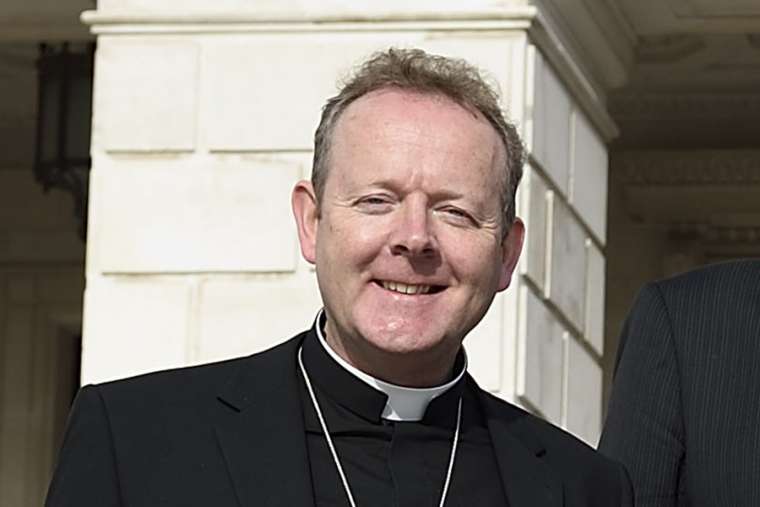Archbishop Eamon Martin Northern Ireland Executive CC BY ND 2.0
The Primate of All Ireland said yesterday that the coronavirus pandemic gives Catholics a chance to rescue the real St. Patrick — who was brought to Ireland as a slave — from things like green beer and shamrocks.
In a message yesterday “to the people of Ireland at home and abroad,” Archbishop Eamon Martin noted that for the second year, celebrations of St. Patrick’s feast day, like parties and parades, have been curtailed by COVID-19 restrictions.
“Down the centuries many customs, myths and paraphernalia have grown up around St. Patrick and the celebration of his feast day at home and abroad,” he said.
“But perhaps, paradoxically, the restrictions this year are opening up an opportunity for us to focus a little more on St. Patrick himself, and even rescue the real St. Patrick from the legends and distractions surrounding him.”
The archbishop of Armagh said that one of the best places to find the “true story of Patrick” was in the saint’s own writings: The Confession of St. Patrick and Letter to the Soldiers of Coroticus.
“You won’t find any mention there of green beer, snakes, or even shamrock — but you will discover the testimony of a real person who dedicated his life and energies to spreading the Good News of Jesus Christ,” Martin said.
St. Patrick was taken from his family’s home in Britain as a teenager and trafficked to Ireland, where he worked as a slave until he was able to escape and return to his homeland.
The archbishop explained that though Patrick was raised as a Christian, he had little understanding or knowledge of the true God.
When Patrick was alone minding sheep in captivity in Ireland, “he found strength and courage in prayer and grew to know God’s love and protection in a powerful and personal way,” Martin said.
He explained that after Patrick had escaped back to his homeland, he heard the “voice of the Irish” calling him back to Ireland, where he returned as a priest and bishop “to share the joy of the Gospel with the people who had once held him captive.”
The Primate of All Ireland said that St. Patrick’s writings revealed his struggles and trials as a missionary, and the dangers and opposition he faced from those who resisted the spread of Christianity in Ireland, as well as from people within the Church who said Patrick had a questionable past and was unfit to be a bishop.
Though he was aware of his own sinfulness and lack of education, “St. Patrick never doubted that God — Father, Son, and Holy Spirit — was with him, shielding him from danger and falsehood, and ultimately guiding him, every step of the way,” Martin underlined.
“Although it is not contained in St. Patrick’s own writings, the traditional prayer which we know as St. Patrick’s Breastplate, harmonizes with the picture of the saint which we pick up in his own writings,” he continued.
The archbishop said he prayed that those who were struggling in the midst of the coronavirus pandemic would find in St. Patrick “the courage and resilience they need to go on, surrounded, as he was, by the love and protection of God.”
“Thinking about Ireland, north and south, at this pivotal moment in our shared history,” he said, “a time when we look back one hundred years: to separation and partition on this island and all that has happened to divide, grieve and polarize us.”
“Thinking at the same time about the achievements and progress of Irish people, and about the possibilities for lasting peace and reconciliation, for harnessing the beauty and uniqueness of our land, and for building relationships that will bring us closer together rather than divide us — I pray that we will find in St. Patrick a source of courage, shared identity and values and the resilience we need to face with confidence new possibilities for today and tomorrow on this island,” Martin said.
Source: CNA

